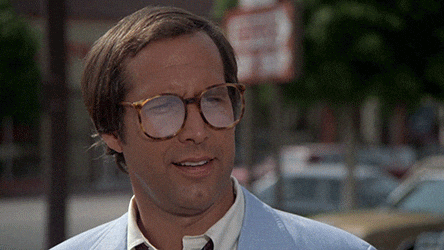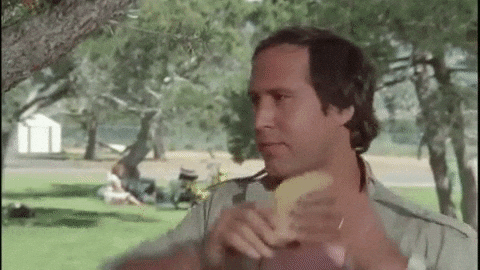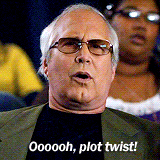I know, I know. The big difference is that they're two different words, right? Stop being such a smart alec.

The thing is we've got jobs popping up all over the place in martech. Someone to do this, someone to do that. Someone to water the office plants, and also to calculate how efficient they could be if installed a sprinkler system. Then someone to install the system, and someone to monitor the system. Then someone to shut it all down.
Okay, maybe that's hyperbolic. But the thing is: last year 23% of marketing budgets were spent on martech. Plus, 61% of companies expect their spend to increase in the next 12 months.
But most of all, 61% of CMOs agree that marketing technology is at the heart of marketing strategy, and is critical to meeting customer expectations. So, who's responsible for all this potential success? It's certainly not me.
So, we're going to delve into two such roles today, two roles that often get conflated, but are actually distinct positions with distinct benefits.
We'll be asking the question "What's the difference between MOPs and marketing technologists?", and then we'll even be answering it. You're welcome.
But it's not just about the difference, oh no. It's about how MOPs and marketing technologists contribute to marketing success, their unique responsibilities, and the unique responsibilities of MOPS and Marketing Technologists.
Looking for the down low from a download? Want to be overly-informed on Marketing Ops? Well, check out our Marketing Ops Best Practice Guide, here!
Let's jump in.
What is a marketing technologist?
A marketing technologist is a pretty new role. This position involves combining information technology knowledge (IT), and creative marketing skills. Think left and right brain collaborating at all times.
The role is all about three words: streamlining, streamlining, streamlining. Having a marketing technologist on your team means that the relationship between IT and marketing is smooth, efficient, and yes - streamlined. That's why we love 'em.

The main focus of a marketing technologist is making sure marketing strategies stick to the business' goals, selecting the best tech vendors, and cooperating with IT.
But a marketing technologist's role goes way beyond smushing IT and marketing together. They tend to be highly skilled individuals who can design and operate tech solutions, all to benefit marketing. But, thanks to their birds-eye view, they can see the context of the tech in marketing, and vice-versa.
Marketing technologists may also:
- Advise clients on tech issues
- Advise clients on creative issues
- Implement solutions like content management
- Choose publishing systems and workflow tools
- Recommend tools and analyse customer data
- Manage A/B tests
Why should you have a marketing technologist on your team?
According to Mike Braund, Senior director of marketing operations at Apollo GraphQL, marketing technologists are vital for:
"Marketing tech stack strategy, budget management, technology governance and making that stack work together and integrate well."
This role means the difference between having a jumbled, overlapping tech stack, and not. He continues:
"There are several technologies that look very similar. [A Marketing Technologist's] job is to decide what capabilities are required to support your use cases and provide those with as little duplication as possible. We help people with technology evaluations and implementing and managing many of those tools."
Because of this knowledge, a marketing technologist can help IT and marketing understand each other. This can range from the goals, to the objectives, to the constraints on each team.
Scott Brinker stated in an article for Advertising Age the importance of having this distinct role:
“Marketing has become deeply entwined with technology. This didn’t happen overnight; it’s been sneaking up on us for a while. But because technology had been so tangential to marketing management for most of our history, the organizational structure of marketing has been slow to adjust to this new technology-centric reality.
But we’ve clearly reached a tipping point. To fully reap the benefits of this Golden Age, marketing must officially take ownership of its technology platforms and strategies."
Because of this growth, it's important to have marketing technologists who can provide an insightful voice in the organisation. This means someone who works closely with the business leaders, in order to create executable tech-based strategies, in order to make life easier and more streamlined for marketing. So, they're not on the side lines, oh no. Marketing technologists should have the chance to become involved in strategic management decisions, relationship decisions, and marketing management development.
What is Marketing Operations?
Right, let's head on over to the other corner.

The 'modern era' of marketing operations began in 2005, when IDG first defined the term. Basically, the huge growth in marketing software meant professionals were needed to select, deploy, and operate all these shiny new toys.
Some people see marketing operations as the foundation of marketing. Basically, this role allows for direction and communication, as a means of working towards a common and defined business goal. This is done through the use of proven frameworks and data analysis.
So, MOPs are the glue that holds the business together, combining planning, technology, data and processes into one effective, scalable package.
Alexandre Pelletier, CEO of Perkuto, says it like this:
“Marketing operations is the art and science around connecting the right technology, having the proper processes, people, and training so that it can all work well cohesively.”
MOPs teams commonly operate in one of three ways: in-house teams, agency, or a combination of the two.
So, what tools do MOPs use most commonly? Well, these can include:
- Marketing Automation Platforms
- CRM tools
- Integration Platform as a Service
- Marketo Integrations
Why should you hire MOPs professionals?
Well, let's start with some stats. Marketing operations provides a 15% to 25% improvement in marketing effectiveness, according to McKinsey.
So, MOPs can take a bunch of messy, sloppy numbers, sort them right out, and fill in any gaps. This all stems from their ability to interpret data, and their knowledge and insights, which can focus the marketing team to improve the customer experience and engagement.
According to our very own Carlos Doughty:
“Marketing Operations are essentially democratising the use of technology, so that less tech-savvy marketers can move with speed and make things happen as well.”
Marketing operations managers prove marketing value to stakeholders, whilst also:
- Hiring talent
- Having technical oversight of the marketing stack
- Establishing, maintaining and scaling processes for marketing campaigns
- Optimising reports
- Approve or veto purchase of marketing technology products
- Analysing data
- Training employees
- Developing career paths
- Managing workflow
- Integrate marketing technology products with each other
- Maintain and monitor data quality
- Communicating metrics with upper management
- Design, run, and optimize/test marketing campaigns
- and more!
So, MOPs can coordinate parts of the marketing organisation structure, take up product management roles, and connect the dots between strategy and execution.
Like marketing technologists, they connect the dots, but this time it's not IT and marketing, but strategy and execution. This leads to aligned campaign messaging, and collaborative teams, all working towards the CMOs vision and objectives.
This all means that MOPs aren't just tied to the marketing department, they drive growth across the entire business.
Externally, hiring MOPs means a business can adapt to a data-first mentality, using this data to reach targets and shape future campaigns. So, if every step is made with a bunch of proven data behind you, then it gives the entire organisation a leg-up. Plus, it reduces costs and time wasted.
MOPs also help with marketing automation and campaign management solutions. In fact, 70% of MOPs replying to the 2020 Career survey said these were at the top of their day-to-day list.
So, I guess you're looking for a metaphor to describe the effectiveness of MOPs. Well, I don't have one. But LXA fave Darrell Alfonso does:
“Marketing ops is like the pit crew, and sales and marketing are the race car drivers. Marketing operations replaces the wheels, tunes up the engine, refuels, keeps an eye on all the instrumentation and constantly talks to the driver to find out what he or she needs.
An effective pit crew enables a driver to focus on winning the race, and not on things like if his or her car will fail during the race. The more planning, guardrails, and smart processes we have in place, the faster marketers can go.”
This overview can be so effective, that nearly 60% of large technology firms have hired staff into formal Marketing Operations positions. In fact, Andy Hasselwander suggests that B2B companies in the Fortune 500 may even begin to hire staff for defined Marketing Operations departments.
But this doesn't limit the role to big companies. Small firms can really benefit. Marketers at smaller businesses can thrive using the process ability, marketing accountability, and streamlined infrastructure that MOPs specialise in. So, this means every marketer can become a MOPs manager.

According to Debbie Qaqish, CMOs who use MOPs in an effective way can lead to marketing being seen in a different light across the entire organisation:
“CMOs who succeed in accelerating wider digital transformation, who adopt financial accountability and who lead customer-centricity cannot do this with a marketing operations group focused on operational measures. They need a strategic marketing operations organization that envisions and drives change through the magic formula of people, process, technology and data.”
McKinsey believes the unsexy data-focused nature of MOPs makes it a stand-out role.
"Marketing operations has traditionally been overshadowed by sexier marketing tactics. Yet as consumers become increasingly empowered and sophisticated in the way they make purchasing decisions, it’s never been more important to use data to map customers’ DNA, understand exactly what they want, and then take those insights to develop and deliver a superior (and flawless) customer experience. As outcomes go, we think that’s pretty sexy indeed.”
So, what’s the difference?
Well, we have established one overarching similarity - martech.
Both roles are needed now that martech has grown to be a necessity, not an add on.
The MOPs role has a slightly wider reach than that of a marketing technologist, however. But that doesn't mean they overshadow the technologist; a marketing technologist can be used as a bridge between the consumer experience and marketing operations themselves.

Whereas MOPs takes a huge, organisation wide view of marketing, marketing technologists can see the wider view of IT and Marketing, specialising in the collaboration between these two departments.
But both roles offer businesses a specific benefit: agility.
"Even if marketers don’t adopt agile in the exact same way it’s used in the software community, they’re taking the core concepts and adapting them to their needs," says Scott Brinker.
"The essence of agile —transparency, quick feedback loops, distributed leadership further down in the organization, shorter cycles of action at greater frequency—is exactly what marketing needs to harness the potential that marketing technology has to offer."

TLDR;
Marketing technologists and Marketing Operations (MOPs) professionals play distinct but crucial roles in the ever-evolving field of martech.
Marketing technologists bridge the gap between IT and marketing, streamlining operations and implementing tech solutions to align with business goals.
On the other hand, MOPs professionals coordinate marketing activities, optimise campaigns, and leverage data analysis to enhance marketing effectiveness.
Both roles are vital in harnessing technology, driving innovation, and delivering seamless customer experiences in today's data-driven marketing landscape.
Want to get qualified in either one of these roles? Well, you're in luck. Check out our certified courses for Marketing Technology Essentials and Marketing Operations Essentials, here!
